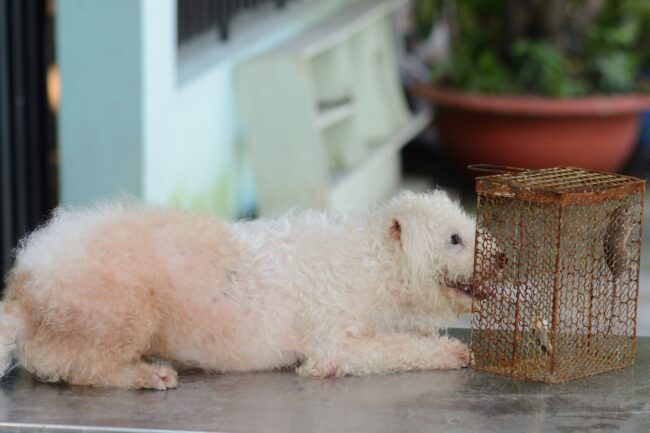Table of Contents
Our furry companions are enthusiastic explorers. They love to go on walks, investigate everything in the garden, and follow scent trails. Unfortunately, dogs also experience the world around them by licking and often swallowing things they really should not.
But what if your dog scarfed down a mouse? You might worry that the rodent was a disease carrier and whether your dog might suffer adverse effects from eating something that is never in his diet. Like fur and mouse skeleton!
If your dog has eaten a mouse, you must not take it lightly. This article focuses on the various signs and reasons your dog has eaten a mouse, along with what you should do to protect your fur balls!
Signs That Your Dog Ate A Mouse
Mice are nothing but meat to dogs. However, if your dog feeds on it, it can prove to be problematic. Some mice can cause significant harm to your dogs. If you saw the dog eat a mouse, then you know what happened. But here are signs that your pup might’ve hunted a rodent down when you weren’t looking.
- Vomiting
- Coughing
- Weakness
- Blood in urine
- Bruises on the body
- Diarrhea
- Bleeding gums
- Paralysis
- Swollen joints
- Breathing problems
- Trembles
- Seizures
What to Do If Your Dog Has Eaten A Mouse
As responsible dog owners, you need to bring your dog to the vet or a pet health care center if he or she has eaten or bitten a mouse. Mice can be poisonous or have rabies.
Such mice are likely to leave a very negative effect on your dog’s body that shall require immediate care and attention.
If you can spot leftovers of the rodent, use gloves and a plastic bag to collect and show the remains to your vet for an examination. In such circumstances, the vet is likely to run rabies tests on the mouse and then your dog.
Refrain from using home remedies, as they may worsen your dog’s condition. Any misstep can make it more difficult to fix the situation.
What is the Source Of Poisonous Mice?
Poisonous rats usually come from the wild or unclean places such as the drainage systems. In other cases, rats may have been poisoned by accidentally feeding on rat poison. Some rat poisons include:
Phosphides
Rat poisons based on aluminum and zinc phosphates are hazardous for your dogs. Once ingested, these phosphides begin to release gases in your dog’s stomach. These gases will increase with food.
Thus, it’s best not to feed your dog post-ingestion of this poison. Some of the common after-effects include vomiting, lung infections, and shock.
Bromethalin
This rat poison can cause cerebral edema, making it one of the most dangerous and harmful toxins for consumption. It directly affects the brain due to the lack of oxygen.
In such situations, your dog will have to stay in the clinic for several days until the treatment is complete. If not treated on time, it can lead to death.
The Dog’s Condition after Eating Mouse
A mouse can prove fatal for your dog due to the various poisons or rabies in the rodent’s system. A dog can catch a rat-bite fever from the carcass of a dead rat or even a small scratch. In such cases, in addition to the consequences mentioned above, your dog can also:
- Get fleas
- Get infected by rabies
- Face lethargy
It’s best to get your dog’s rabies shots and annual boosters from time to time to avoid such situations. This vaccine helps in maintaining their health and strengthening their immune systems against this terrifying disease.
How To Stop Your Dog From Eating Mice
As mentioned earlier, dogs are curious animals and are often unaware of what they should and should not eat. This habit gets them and their dog owners in trouble. While some items may not be as harmful to your dog’s health, things like mice can affect your dog negatively.
Unless you have these pesky rodents on your property, it will be easy for you to prevent such situations. Also, try to keep away any rodenticides out of your dog’s reach.
To stop your dogs from eating a mouse, you can apply the following tactics:
- Training your dog in terms of dropping or leaving the mouse if he manages to catch it
- Clean your backyard and house properly.
- Getting regular pest control professionals to check your property
- Seal your garbage to avoid providing mice with a great food source.
- Use rat poisons to get rid of mice as soon as possible.
- Keep your dog away from places that are infested with mice.
- Supervise your dog as he goes for his walks or crosses your property. You may never be aware of the rat poisons or the presence of mice on your neighbors’ property.
Wrapping Things Up
In conclusion, you now know that mice are not the safest thing for your dog to eat. This problem can become life-threatening if the rodent has been exposed to rabies or rat poison.
Some of the symptoms you might see in your dog include vomiting, diarrhea, bruises on the body, and many more, as mentioned earlier. Thus, to avoid such circumstances, you must remain careful and keep your pup under constant supervision and care.
As loving and responsible dog owners, you must avoid using home remedies of any kind to treat your dog’s situation and consult the vet. The vet is most likely to run your pup through some tests, including rabies tests, and provide the necessary treatment and medication.

